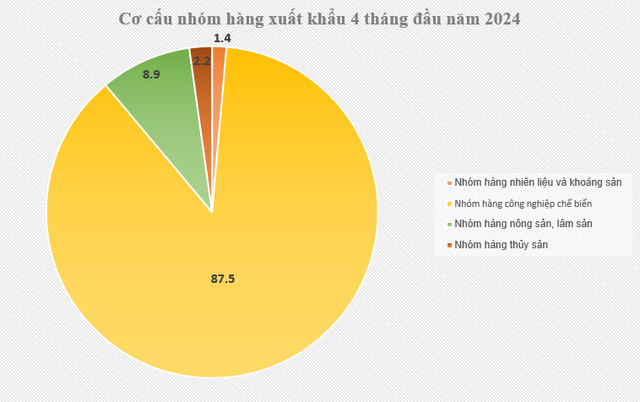During the recent Tet holiday, Nguyen Le Quoc Tuan, CEO of Hương Quê Food Company, livestreamed every day to maintain interaction with customers. However, it was not until February 15th (the 6th day of Tet) that Hương Quê Food opened for business because the delivery service was delayed.
Decreased orders
Similarly, many online sellers on e-commerce platforms also restarted their businesses late after Tet due to various reasons.
According to the e-commerce platform Metric, from the beginning of January 2024 until now, Shopee and TikTok Shop have generated a revenue of 28,700 billion VND with 317.6 million products sold and over 326,000 successful orders from more than 326,000 shops. The peak revenue of these two platforms was reached in the week before Lunar New Year (February 1st to 7th) when consumers rushed to shop, resulting in a total revenue of 4,200 billion VND.
Notably, the purchasing power has not shown signs of recovery after the extended Tet holiday. From February 15th to 18th, the revenue of Shopee and TikTok Shop reached only 1,500 billion VND, a 65% decrease compared to the week before Tet and a 20% decrease compared to the week during Tet. According to Metric, at the beginning of the year, consumers usually do not have plans to purchase high-value goods, leading to a sharp decline in online retail revenue.

Despite many prospects, the e-commerce market has been slow to restart after Lunar New Year. Photo: HOANG TRIEU
Tran Lam, who generates an annual revenue of 70 billion VND on e-commerce platforms with various essential oil and cosmetics brands like JulyHouse, Macaland, Loli & The Wolf, and Heviefood, said that the sales of some products have declined, but other brands have maintained stable revenue.
Dr. Do Quang Huy, an e-commerce expert, evaluates the recent Lunar New Year sales on online channels as quite good. However, due to overloading in delivery services, online sellers ended their Tet holiday earlier than usual and had an extended break. “The online market started slowly this year, and there were few orders during the Tet holiday,” Huy commented.
Demands for professionalism
Dr. Do Quang Huy predicts that in 2024, e-commerce will see stronger growth compared to the 25% growth rate of the previous year. The reason is that many businesses and manufacturers have started selling online to attract buyers with low prices and many gifts by cutting intermediary stages. Additionally, e-commerce platforms continue to offer many discount codes to prioritize cheap prices, catering to consumers’ preference for budget-friendly options.
Market analysis reports also predict that e-commerce will continue to explode this year with a revenue growth rate of around 35%, reaching about 310,000 billion VND. However, this does not mean growth opportunities for all businesses. In 2023, more than 105,000 sellers on the four platforms Shopee, Lazada, Tiki, and Sendo left the market, indicating fierce competition.
“As e-commerce gradually becomes an important platform for product distribution to consumers, businesses will undoubtedly develop in a systematic manner, leading to more fierce competition. Brands that establish their reputation and gain the trust of customers will win in this race,” says a representative from Metric.
Mr. Vu Hung Anh, who owns two TikTok channels named “Hong Kong Grocery 1968” and “Unique Keys in Vietnam,” has been livestreaming his sales since February 13th (the 4th day of Tet) and continues to do so until now. He is working with some domestic manufacturers to distribute products directly at reasonable prices for consumers.
“Selling on TikTok Shop is quite convenient, and there is a large number of buyers. The key factors are having good quality products, reasonable prices, and engaging sales scripts – which are both entertaining and highlight the advantages of the products,” Mr. Hung Anh shared.
According to this online retailer, some brands initially set high prices and attractive commissions for TikTokers. However, he negotiated to lower the selling price, receive fewer commissions, but sell a larger quantity.
Mr. Tran Lam points out that from 2016 to 2018, any individual or business selling products on e-commerce platforms could easily make a profit. However, in recent years, only shops with well-planned and transparent strategies can survive.
“During this period, the market is becoming more professional, forcing online shops to make considerable investments to succeed. I will also invest more in the supply chain, delivering vivid stories about farming and production to consumers. Additionally, I will improve the order processing procedure to shorten the delivery time for customers,” Mr. Lam shared.
Persistence and discipline are keys to successful online sales
Ms. Nguyen Thi Thuy Phuong, the Director of the Mekong Applied Science and Technology Training Institute – a place that implements projects supporting entities participating in the One Commune One Product (OCOP) program and agricultural products in the region to join e-commerce, believes that e-commerce will continue to lead the market in 2024-2025. There is currently a lot of support from the government, platforms, and private organizations to develop online retail.
However, according to Ms. Phuong, not every product and everyone can successfully sell online. “We have provided training courses for 69 individuals in Dong Thap province to sell online, but only 3 of them have maintained their sales. To be successful in online sales, one must be persistent and disciplined; it is not easy,” Ms. Phuong emphasized.





































